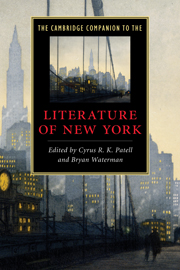Book contents
- Frontmatter
- Introduction
- 1 From British outpost to American metropolis
- 2 Dutch New York from Irving to Wharton
- 3 The city on stage
- 4 Melville, at sea in the city
- 5 Whitman’s urbanism
- 6 The early literature of New York’s moneyed class
- 7 Writing Brooklyn
- 8 New York and the novel of manners
- 9 Immigrants, politics, and the popular cultures of tolerance
- 10 Performing Greenwich Village bohemianism
- 11 African American literary movements
- 12 New York’s cultures of print
- 13 From poetry to punk in the East Village
- 14 Staging lesbian and gay New York
- 15 Emergent ethnic literatures
- Further reading
- Index
- Series list
10 - Performing Greenwich Village bohemianism
Published online by Cambridge University Press: 28 November 2010
- Frontmatter
- Introduction
- 1 From British outpost to American metropolis
- 2 Dutch New York from Irving to Wharton
- 3 The city on stage
- 4 Melville, at sea in the city
- 5 Whitman’s urbanism
- 6 The early literature of New York’s moneyed class
- 7 Writing Brooklyn
- 8 New York and the novel of manners
- 9 Immigrants, politics, and the popular cultures of tolerance
- 10 Performing Greenwich Village bohemianism
- 11 African American literary movements
- 12 New York’s cultures of print
- 13 From poetry to punk in the East Village
- 14 Staging lesbian and gay New York
- 15 Emergent ethnic literatures
- Further reading
- Index
- Series list
Summary
And so the people are standing before Greenwich Village murmuring in pitying tones, “It is not permanent, the colors will fade. It is not based on good judgment. It is not of that sturdy and healthy material from which, thank providence, we of the real Manhattan have been fashioned.” There are others who sigh, “It is beautiful in places!” while others add, “That is only an accident.”
Djuna Barnes, “Greenwich Village as It IsAs one of Amy Lowell's young Harvard acolytes left Boston for a new life in Greenwich Village, the poet sent him off with this warning: “The only thing I beg of you is not to be fooled by Greenwich Village. There are no good people there. They are just failures who agreed to admire each other, since the world refuses to do it for them.” Lowell had good reason to distrust the denizens of Greenwich Village. Though they shared similar artistic tastes and a similar drive to reform American literature, their ends differed dramatically. Lowell's was a conservative, anti-unionist, capitalist, pro-war mindset. The bohemians of the Village, on the other hand, believed in free love, labor reform, socialism, and pacifism. And yet Lowell's snide admonition, however unwittingly, gets at one of the most compelling paradoxes of bohemian Greenwich Village: a belief in failure as the only real mark of success in an America that the activists, anarchists, feminists, artists, writers, and poets who made it their home saw as increasingly smug, acquisitive, and anti-intellectual. Where Lowell notoriously pitched her writing to the general public, working to make the avant-garde accessible and commercially lucrative, the Villagers reveled in rejection by this same audience. They believed art could enlighten minds, shatter social prohibitions, even ameliorate inequities among the classes, and when middle-class audiences responded to their work with confusion and derision, they felt confident they had hit their mark. In rejecting the bourgeois desires of mainstream America, with its hunger for social position and material success, they turned the Village into a place where art reigned supreme as the highest, most noble human achievement.
- Type
- Chapter
- Information
- The Cambridge Companion to the Literature of New York , pp. 146 - 159Publisher: Cambridge University PressPrint publication year: 2010



